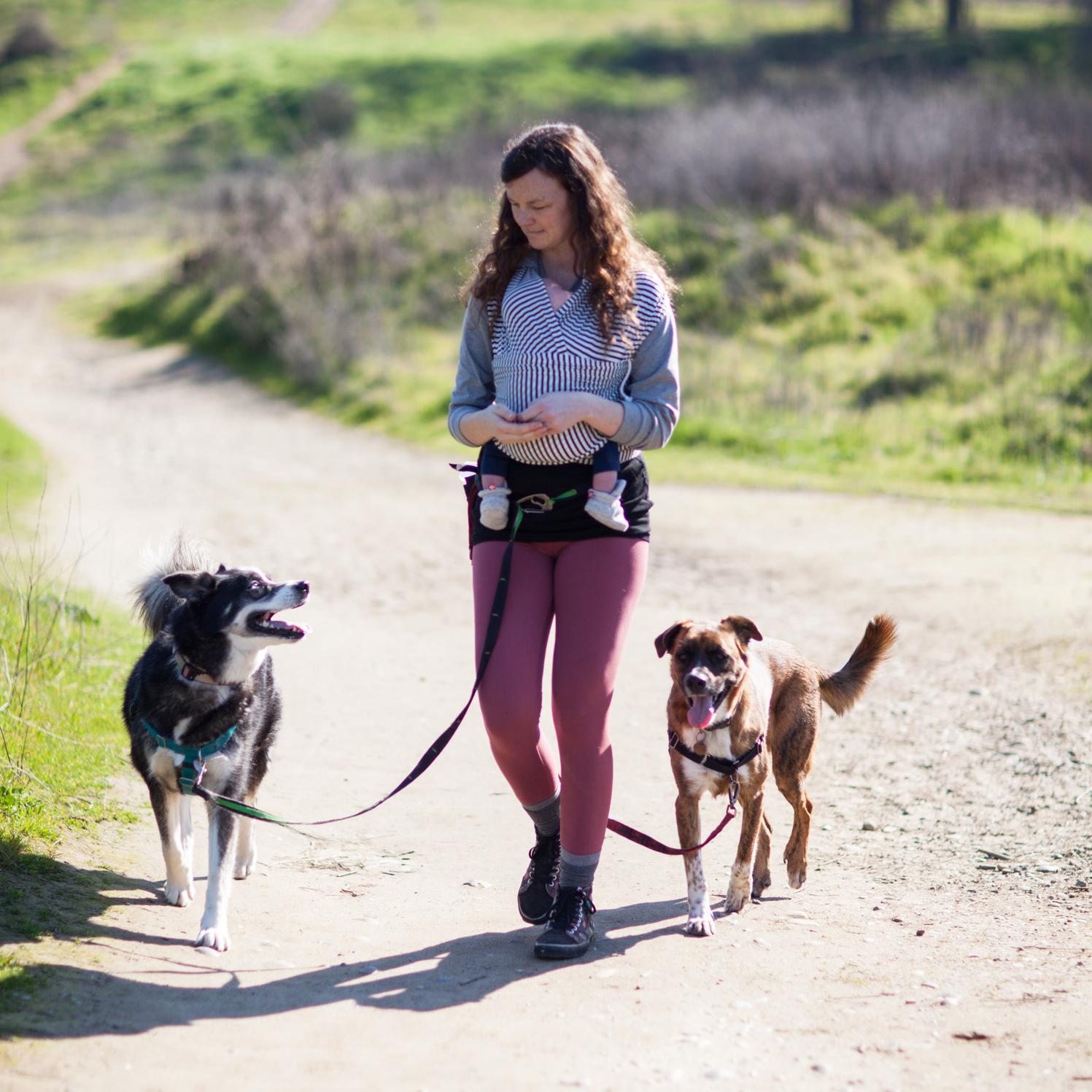Often when people begin to look into dog and baby prep, they are really focused on homecoming - that initial life-changing upheaval of a dog’s life that is bringing a new baby home. And don’t get me wrong, that’s a huge moment, and preparing ahead of time can really be instrumental in getting off on the right foot. But as the Family Paws saying reminds us: Babies grow, dogs age, adjust management at every stage.
If there’s one thing I’ve learned from my new experience in motherhood it’s that things change FAST. My baby, Wiley, is now actually coming close to his fourth month, and it’s just incredible how quickly he grows and develops, and all the new behaviors he’s already acquired along the way. Every baby is different, of course, and they all hit their “milestones” at their own pace. But let’s talk about some of the changes that may begin to occur around this age and how we can make sure we’re prepared to guide our dogs through those changes.
Improved Eyesight
Babies come home with a very limited range of vision, so they spend most of their time focusing on the faces of their caregivers. But after a few months, the world begins to come into focus. This also occurs in conjunction with slowly expanding wake windows, which means they are spending more and more time checking out the world around them.
For dogs, eye contact can be quite impactful. Muchacho, my nervous Mexi-Mutt is really uncomfortable with eye contact from strangers, as are many dogs! This is something to be aware of as your baby develops. Make sure your dog always feels comfortable getting space if needed. Keep in mind that dogs may not always move away when they feel uncomfortable if they’re in a favorite resting spot, near a favorite person, or a valuable resource like food or toys. Watch body language for signs of discomfort and create space yourself if needed.
Wiley is now fascinated with the dogs and watching their every move with big, wide eyes. This still makes Muchacho a little uncomfortable and although he is generally at ease around the baby these days (whereas he initially didn’t like to be too close), he will avert his eyes and move away if he catches the baby staring.
Grasping
In the past few months, Wiley has started to learn to grasp objects.This is not only a super fun skill (we can play with toys now!) but also obviously very important for his development. But what my clothes, hair, face and arms can attest to is that the grasping is pretty much indiscriminate at this age.
This means that there is a danger of dog body parts or fur being pinched or grabbed by his undiscerning little hands, which could hurt the dogs. This could cause an immediate reaction (growl, snap, or even bite!) but even if it does not, it can contribute to a negative association with the baby that we want to avoid.
Using good management and active supervision is extremely important during this phase to keep building a strong, positive relationship.
Toys
As mentioned above, now that Wiley is learning to grasp objects, toys have become more prominent in our play. This presents a few potential challenges. First - dog toys and baby toys are virtually indistinguishable. To prevent your dog from mistaking Jr’s toys for his own, make sure toys are stowed out of reach when not in use. When baby is playing, you can reward your dog for ignoring his toys and/or use management to keep him out of the play area.
The other two things that could be potentially alarming to your dog are the accidental flinging of toys in your dog’s direction, or toys that make peculiar noises. This can be alarming for some dogs, so the same basic strategies apply - management, making sure he has an easy exit, and counter conditioning to those new experiences.
Changes in Vocalizations
As Wiley has gotten older, he’s begun to find his voice and is experimenting with new sounds quite often. One of the sounds he’s been trying out has become commonly known in our house as his “raptor scream.” While we find all these new outbursts hilarious, and encourage these new vocalizations, many dogs may find them concerning. Luckily, since his initial concerns with the baby crying, Muchacho doesn’t seem too concerned with Wiley’s noises. However, other dogs may still be disturbed.
As always, making sure the dog feels comfortable getting the space she needs is important. However in this case, doing some counter conditioning can also be helpful. If every time Wiley did his raptor scream, I threw some treats for my dogs, they’d soon regard that sound with pleasant anticipation as a predictor of tastiness instead of cause for concern.
Rolling
Try as he might, Wiley has not quite mastered rolling yet, but some babies may already be pros at getting from tummy to back or vise versa by now! These new movements have the potential to draw the attention of our four legged friends. Some may find these movements arousing in a predatory way - our babies do move a bit like helpless prey. Others may find them concerning, especially in close proximity to the dog, or their valuable resource (food, toys, resting spaces).
Using good management - baby gates, x-pens, etc can really help out in these cases. Putting yourself between dog and baby is another great strategy, as is rewarding appropriate behaviors like stationing.

